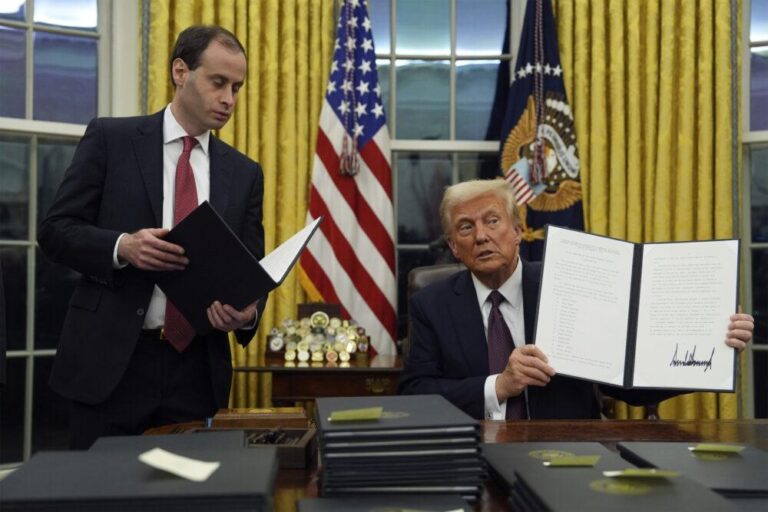Houston Law Firm Launches Legal Challenge Against Federal Executive Order
A leading legal practice based in Houston has initiated a lawsuit contesting a recent executive order issued by the Trump administration. This order, which has ignited significant debate nationwide, introduces stringent measures that the firm contends infringe upon constitutional protections and exceed the scope of presidential authority. Legal analysts predict that this case could become a landmark in defining how courts address executive actions that affect civil liberties.
The complaint highlights several critical objections, including:
- Infringement on due process rights as enshrined in the Constitution
- Discriminatory targeting of particular demographics due to vague and sweeping language
- Lack of adequate coordination with state and municipal governments prior to enforcement
As the case advances through the federal judiciary, both proponents and opponents are bracing for a protracted legal confrontation that may redefine executive power dynamics beyond Texas.
Examining Federalism and Local Autonomy Amid Legal Disputes
Experts in constitutional law warn that the outcome of this lawsuit could significantly reshape the interplay between federal authority and state/local governance. The judiciary’s interpretation will be pivotal in deciding whether the executive order unlawfully encroaches on constitutional limits or legitimately directs federal policy. Key issues under scrutiny include:
- Encroachment on states’ rights and sovereignty
- Restrictions on local government decision-making powers
- Setting judicial benchmarks for future executive mandates
Constitutional scholars emphasize that broad assertions of executive power risk weakening the system of checks and balances fundamental to U.S. governance. State attorneys general and municipal leaders may face diminished capacity to govern independently. The table below outlines major concerns identified by legal authorities:
| Dimension | Possible Consequence | Legal Implication |
|---|---|---|
| Federalism | Constrained state policy-making freedom | Potential breach of the Tenth Amendment |
| Local Governance | Heightened federal intervention | Threat to municipal self-governance |
| Judicial Precedent | Broadened executive authority | Risk of unchecked presidential directives |
Community Reactions and Stakeholder Perspectives on the Lawsuit
Following the filing of the lawsuit by the Houston law firm, community leaders have expressed a spectrum of opinions. Advocates for immigrant rights and civil liberties hail the legal challenge as a vital defense of marginalized groups. Elena Ramirez, coordinator at the Houston Immigrant Alliance, remarked, “This lawsuit embodies our community’s determination to resist policies that jeopardize the dignity and security of our neighbors.” Conversely, some business representatives voice apprehension about the economic fallout, calling for policies that balance enforcement with economic stability.
Key points of debate among stakeholders include:
- Constitutional legality: Scrutiny over whether the executive order aligns with fundamental rights
- Public safety concerns: Potential for increased community distrust and social tension
- Economic impact: Risks to small businesses and workforce continuity
- Advocacy and mobilization: Efforts to support affected families and push for legislative oversight
| Group | Stance | Primary Concern |
|---|---|---|
| Civil Rights Organizations | Endorse Lawsuit | Safeguarding individual liberties |
| Business Community | Apprehensive | Maintaining economic health |
| Local Government Officials | Varied Opinions | Ensuring public order and safety |
Effective Strategies for Addressing Legal Challenges to Federal Orders
When confronting legal disputes involving federal directives, it is essential to conduct a meticulous examination of the executive order’s provisions and their effects on affected parties. Retaining attorneys with expertise in federal litigation is critical to crafting a robust legal strategy. Equally important is the comprehensive documentation of harm and standing, as courts demand clear evidence of the order’s direct impact on plaintiffs. Timing the initiation of legal action strategically can also enhance the case’s alignment with broader public interests and judicial trends.
Before proceeding with litigation, stakeholders should explore various legal mechanisms, such as:
- Seeking preliminary injunctions to temporarily suspend enforcement during litigation
- Filing class-action lawsuits to consolidate claims from similarly affected individuals
- Partnering with advocacy organizations to bolster resources and public awareness
- Monitoring federal agency guidelines for possible administrative remedies or policy adjustments
| Phase | Focus Area | Recommended Approach |
|---|---|---|
| 1. Directive Assessment | Scope and Legal Authority | Comprehensive expert legal analysis |
| 2. Establishing Standing | Evidence of Harm | Collect affidavits and documentation |
| 3. Litigation Initiation | Jurisdiction and Timing | Coordinate filings for strategic advantage |
| 4. Pursuing Remedies | Injunctions or Declaratory Relief | Request judicial intervention to halt enforcement |
Conclusion: Ongoing Legal Conflict and Its Broader Implications
The lawsuit initiated by the Houston-based law firm against the Trump administration’s executive order highlights the persistent friction surrounding federal policy and its local impact. As this legal dispute unfolds, it will be closely monitored for its potential to influence the distribution of power between federal and state governments, not only in Texas but across the nation. Houston Public Media remains committed to delivering comprehensive coverage as this significant case develops.




